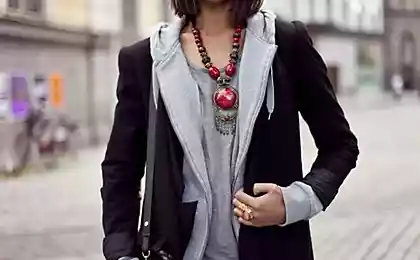469
The expression of anger in men and women: evaluation of image in the eyes of others
During the election campaign in the US a few years ago, presidential candidate Hillary Clinton was "rejected" by some politicians as "too angry to be elected". This has prompted psychologists to the study.
Sixty nine million four hundred ninety nine thousand four hundred seventy eight
"A wicked man as the devil, the wicked woman and the whole Inferno," says the Norwegian proverb. Folk wisdom, as always, right — this once again proved the tower of Victoria Brescoll (Yale University) and Eric Uhlmann (northwestern University). Their experiments in his book "the Evolution of man: monkeys, neurons, and soul," says a well-known popularizer of science, an evolutionary psychologist, biologist and paleontologist Alexander Markov.
The purpose of the study was simple — to find out how the expression of anger in men and women affect the valuation of their image in the eyes of others, and to advance their career. This group of psychologists conducted a series of experiments that showed that the angry man more nice people and he has more chances to get a job or get a promotion than a man in the same circumstances falls into sadness and gloom. But with women, such studies have not been conducted. Three series of experiments, psychologists from Yale and northwestern universities has helped to fill this gap. Volunteers participated in the experiment were adults, educated, white U.S. citizens, male and female.
In the first case, each subject was shown a video recording of the interview on the job. The actors (one woman and one man) told the employer about how you lost a valuable paper on the old paper. The employer questioned them about the feelings experienced by the "candidates". The latter, in turn, demonstrated and spoke about only two variants of emotions — anger and distress. So, it turned out only four of the video: "angry man", "sad man", "angry woman" and "sad woman". Both actors were "equally attractive" and were the same age.
Each of the participating in the experiment watched only one movie, and then he, answering the relevant questions had to Express how he refers to the "applicant".
The results confirmed previous findings of other studies: the angry man looks in the eyes of others as more competent (eligible for a good salary and a prestigious position), in contrast to men sad. How fared against women? The opposite way. Distressed ladies definitely much more "like" people than angry. In addition, they lead sad men and angry men lost quite a bit.
And yet the experiment showed that male anger around, usually seen as something justifiable, something that is caused by external factors. Female anger, on the contrary, is perceived as a manifestation of "bad character," ladies. This is understandable, because a male would normally expect the hardness and rigidity and from the feminine — softness and mercy.
Thirty one million nine hundred ninety eight thousand three hundred ninety five
Anger is considered an emotion that is associated with the status. This means that high-ranking individuals are entitled to be angry, and low-ranking have no such right. Therefore, the second part of the experiment, the videos have changed — they are "applicant", inter alia reported to the employer his position in his previous job: in one case, he talked about the position of major of the head, and in another to the post of "Junior assistant senior janitor". The results of the study are not affected: women's anger is still perceived negatively, regardless of what position she held. The same, however, as it turned out, is true for men — men's rage did not become more justified, no matter what post was occupied by "applicant".
In addition, the "melancholy" experienced by the actors in the frame in the second modification of the experiment was replaced with no emotion at all. The researchers felt that sadness too independent emotion, which is not quite correct to carry out research anger. But the results were not changed — anger women were also less popular than cold-blooded as they were less popular than sad. In men, the situation has changed: the angry men were only slightly "more popular" cold-blooded, although the salary of the last made more than the first. Therefore, scientists concluded that the expression of sadness can harm the image of the man, while his composure and anger almost equally profitable ("almost" — because in other experiments the angry males on all items turned out to be more popular than cold-blooded).
The last stage of the experiments was that the organizers tried to explain to the audience that women's anger is not caused by bad character "of soiskatelei" or lack of self-control and objective reasons that do not depend on women. In a new series of videos "applicant" has already lost the vinyl in paper partner who alleged she was deceived. Interesting, but it's almost completely justified the angry women in the eyes of the audience — now they were pretty much the same as emotionless ladies, and a lot more than angry women, don't explain "objective" reasons for their anger.
But in men this time the situation was the opposite: if the angry man put all the blame on the colleague — the sympathy of others dramatically reduced. "So who is angry with his female to make a good impression, should explain the reasons for their anger and throw the blame on others, but the angry men it is better not to do" — half-jokingly half-seriously suggests Markov. These results apparently again reflect certain stereotypical expectations from different genders from male are waiting for activity and more responsible and the female — dependence and passivity ("I'm not guilty, he came"). published
Author: Olga Fadeeva
P. S. And remember, just changing your mind — together we change the world! ©
Source: naked-science.ru/article/psy/zlaya-baba-tseloe-peklo
Sixty nine million four hundred ninety nine thousand four hundred seventy eight
"A wicked man as the devil, the wicked woman and the whole Inferno," says the Norwegian proverb. Folk wisdom, as always, right — this once again proved the tower of Victoria Brescoll (Yale University) and Eric Uhlmann (northwestern University). Their experiments in his book "the Evolution of man: monkeys, neurons, and soul," says a well-known popularizer of science, an evolutionary psychologist, biologist and paleontologist Alexander Markov.
The purpose of the study was simple — to find out how the expression of anger in men and women affect the valuation of their image in the eyes of others, and to advance their career. This group of psychologists conducted a series of experiments that showed that the angry man more nice people and he has more chances to get a job or get a promotion than a man in the same circumstances falls into sadness and gloom. But with women, such studies have not been conducted. Three series of experiments, psychologists from Yale and northwestern universities has helped to fill this gap. Volunteers participated in the experiment were adults, educated, white U.S. citizens, male and female.
In the first case, each subject was shown a video recording of the interview on the job. The actors (one woman and one man) told the employer about how you lost a valuable paper on the old paper. The employer questioned them about the feelings experienced by the "candidates". The latter, in turn, demonstrated and spoke about only two variants of emotions — anger and distress. So, it turned out only four of the video: "angry man", "sad man", "angry woman" and "sad woman". Both actors were "equally attractive" and were the same age.
Each of the participating in the experiment watched only one movie, and then he, answering the relevant questions had to Express how he refers to the "applicant".
The results confirmed previous findings of other studies: the angry man looks in the eyes of others as more competent (eligible for a good salary and a prestigious position), in contrast to men sad. How fared against women? The opposite way. Distressed ladies definitely much more "like" people than angry. In addition, they lead sad men and angry men lost quite a bit.
And yet the experiment showed that male anger around, usually seen as something justifiable, something that is caused by external factors. Female anger, on the contrary, is perceived as a manifestation of "bad character," ladies. This is understandable, because a male would normally expect the hardness and rigidity and from the feminine — softness and mercy.
Thirty one million nine hundred ninety eight thousand three hundred ninety five
Anger is considered an emotion that is associated with the status. This means that high-ranking individuals are entitled to be angry, and low-ranking have no such right. Therefore, the second part of the experiment, the videos have changed — they are "applicant", inter alia reported to the employer his position in his previous job: in one case, he talked about the position of major of the head, and in another to the post of "Junior assistant senior janitor". The results of the study are not affected: women's anger is still perceived negatively, regardless of what position she held. The same, however, as it turned out, is true for men — men's rage did not become more justified, no matter what post was occupied by "applicant".
In addition, the "melancholy" experienced by the actors in the frame in the second modification of the experiment was replaced with no emotion at all. The researchers felt that sadness too independent emotion, which is not quite correct to carry out research anger. But the results were not changed — anger women were also less popular than cold-blooded as they were less popular than sad. In men, the situation has changed: the angry men were only slightly "more popular" cold-blooded, although the salary of the last made more than the first. Therefore, scientists concluded that the expression of sadness can harm the image of the man, while his composure and anger almost equally profitable ("almost" — because in other experiments the angry males on all items turned out to be more popular than cold-blooded).
The last stage of the experiments was that the organizers tried to explain to the audience that women's anger is not caused by bad character "of soiskatelei" or lack of self-control and objective reasons that do not depend on women. In a new series of videos "applicant" has already lost the vinyl in paper partner who alleged she was deceived. Interesting, but it's almost completely justified the angry women in the eyes of the audience — now they were pretty much the same as emotionless ladies, and a lot more than angry women, don't explain "objective" reasons for their anger.
But in men this time the situation was the opposite: if the angry man put all the blame on the colleague — the sympathy of others dramatically reduced. "So who is angry with his female to make a good impression, should explain the reasons for their anger and throw the blame on others, but the angry men it is better not to do" — half-jokingly half-seriously suggests Markov. These results apparently again reflect certain stereotypical expectations from different genders from male are waiting for activity and more responsible and the female — dependence and passivity ("I'm not guilty, he came"). published
Author: Olga Fadeeva
P. S. And remember, just changing your mind — together we change the world! ©
Source: naked-science.ru/article/psy/zlaya-baba-tseloe-peklo























